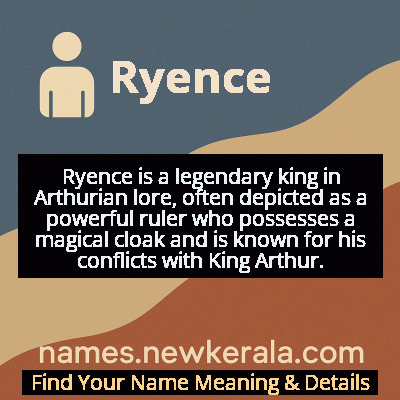Ryence Name Meaning & Details
Origin, Popularity, Numerology Analysis & Name Meaning of Ryence
Discover the origin, meaning, and cultural significance of the name RYENCE. Delve into its historical roots and explore the lasting impact it has had on communities and traditions.
Name
Ryence
Gender
Male
Origin
Arthurian
Lucky Number
7
Meaning of the Name - Ryence
Ryence is a legendary king in Arthurian lore, often depicted as a powerful ruler who possesses a magical cloak and is known for his conflicts with King Arthur.
Ryence - Complete Numerology Analysis
Your Numerology Number
Based on Pythagorean Numerology System
Ruling Planet
Neptune (Ketu)
Positive Nature
Intuitive, analytical, spiritual, and inquisitive.
Negative Traits
Secretive, reserved, aloof, and can be overly critical.
Lucky Colours
Green, yellow.
Lucky Days
Monday.
Lucky Stones
Cat’s eye, moonstone.
Harmony Numbers
1, 5, 6.
Best Suited Professions
Scientists, researchers, spiritual leaders, detectives.
What People Like About You
Depth of knowledge, analytical skills, spirituality.
Famous People Named Ryence
King Ryence
Mythological Monarch
Ruler of North Wales mentioned in Thomas Malory's Le Morte d'Arthur; known for his magical cloak made from kings' beards
Ryence ap Cynfyn
Welsh Chieftain
Historical figure from Welsh genealogies who may have inspired the Arthurian character
Ryence of the Marches
Border Lord
Defender of Welsh borders against Saxon invaders in Arthurian romances
Name Variations & International Equivalents
Click on blue names to explore their detailed meanings. Gray names with will be available soon.
Cultural & Historical Significance
His story intersects significantly with the political dynamics of Arthur's Britain, representing the complex relationship between the High King and regional rulers. When Ryence demands Arthur's beard, he's essentially challenging Arthur's supremacy, but after being defeated (usually by Arthur's knights rather than Arthur himself), he becomes one of Arthur's loyal vassals. This narrative arc illustrates the process of political consolidation under Arthur's rule. The character also connects to broader European Arthurian tradition through French romances where he appears as 'Ryens,' showing how Welsh local legends were absorbed into international Arthurian cycles. His presence in these stories helps ground the fantastic elements of Arthurian romance in the historical reality of multiple competing kingdoms in post-Roman Britain.
Extended Personality Analysis
The name Ryence carries strong connotations of leadership, tradition, and aristocratic bearing. Individuals with this name are often perceived as natural leaders with an innate sense of authority and command. They typically exhibit confidence and determination, combined with a deep respect for heritage and cultural traditions. The legendary Ryence's character suggests someone who is ambitious and proud, possibly with a tendency toward arrogance that needs tempering with wisdom and experience. Modern bearers of the name might be expected to display strategic thinking and political acumen, reflecting the diplomatic challenges their namesake faced in Arthurian narratives.
There's also a creative and perhaps slightly eccentric dimension to the personality associated with Ryence, stemming from the unusual beard-collecting aspect of the legend. This suggests someone who might have unconventional methods or interests but approaches them with serious purpose. The magical associations of the cloak indicate potential interest in esoteric knowledge or alternative ways of thinking. Overall, the name suggests a complex personality balancing traditional authority with individualistic tendencies, someone who commands respect through both conventional leadership qualities and unique personal characteristics. The historical weight of the name implies a person who takes responsibilities seriously and values their cultural and familial legacy.
Modern Usage & Popularity
In contemporary times, Ryence remains one of the rarest Arthurian names in actual usage, primarily appearing in scholarly contexts, historical fiction, and among dedicated Arthurian enthusiasts. The name has never ranked in official baby name statistics in English-speaking countries, making it exceptionally distinctive. Its modern appeal lies in its deep Celtic roots and strong Arthurian connections, attracting parents interested in Welsh heritage or medieval literature. However, the name's obscurity and challenging pronunciation for non-Welsh speakers have limited its widespread adoption. Recent years have seen growing interest in unique Celtic names, but Ryence remains far less common than other Arthurian names like Tristan, Gareth, or Morgan. It occasionally appears in fantasy literature and gaming as a character name, helping maintain its presence in popular culture despite its rarity in actual naming practices. The name's strongest modern usage is in Wales itself, where traditional names have experienced a revival, though even there it remains uncommon compared to other Welsh historical names.
Symbolic & Spiritual Meanings
Ryence symbolizes the complex interplay between personal ambition and collective sovereignty in medieval political thought. The legendary cloak made from kings' beards serves as a powerful metaphor for accumulated authority and the symbolic nature of royal power. Each beard represents not just a defeated rival but a incorporated source of strength and legitimacy, reflecting ancient beliefs about hair as a repository of personal power and vitality. This makes Ryence a symbol of both pride and the dangerous allure of absolute power. The name also represents the tension between regional identity and centralized authority that characterized Arthurian Britain and continues to resonate in modern discussions of federalism and cultural autonomy.
Metaphorically, Ryence embodies the Celtic concept of kingship where rulers derived authority from both martial prowess and mystical connections to the land. His story illustrates how personal ambition must ultimately submit to greater political unity, as seen in his eventual acceptance of Arthur's overlordship. The magical aspects of his legend connect him to broader themes of enchantment and supernatural protection in Celtic tradition. In contemporary symbolic terms, Ryence can represent the importance of respecting tradition while acknowledging the necessity of cooperation and hierarchy in maintaining social order. The name carries echoes of ancient courtly values, the mystique of Celtic spirituality, and the enduring human fascination with the magical aspects of leadership and authority.

